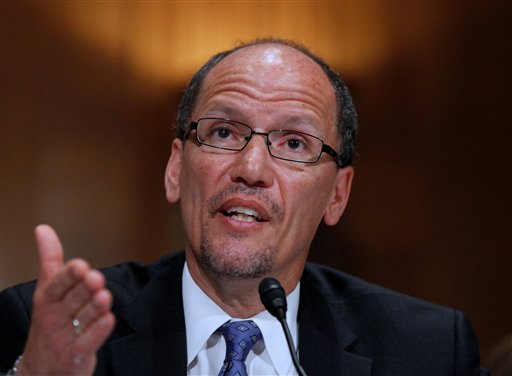By SAM HANANEL
Associated Press
WASHINGTON
The recent spate of fast-food worker strikes is another sign of the need to raise the minimum wage for all workers, Labor Secretary Thomas Perez said in an interview with The Associated Press.
Perez’s comments came in a wide-ranging interview, his first since taking the helm of the agency a little over a month ago following a contentious confirmation process.
Formerly the nation’s top civil rights enforcer, Perez said late Wednesday that he sees many parallels between his old job and his new post as labor secretary. His primary role, he said, will be as an advocate for workers.
Besides supporting higher wages, Perez also plans to continue the work of his predecessor, Hilda Solis, in cracking down on companies that violate labor laws and making sure there’s a “level playing field” for employers who follow the rules.
He compared the recent protests to the demands of demonstrators in the 1963 March on Washington who sought a national minimum wage to give workers better living standards.
While he declined to address fast-food workers’ demand to raise wages to $15 an hour, Perez said he is taking a lead role in President Barack Obama’s push to boost the federal minimum wage from $7.25 to $9 an hour. Obama has called for the wage hike in several recent speeches on the economy, but Congress has not acted.
Senate Republicans who opposed Perez’s confirmation had complained that his record of vigorous enforcement of civil rights laws at the Justice Department foreshadowed an overly activist approach at Labor. But Perez said he’s made a point of meeting with business leaders and stressed that his previous tenure as head of Maryland’s Department of Labor, Licensing and Regulation showed an even-handed approach that won praise from business groups like the Maryland Chamber of Commerce.
AFL-CIO President Richard Trumka told reporters Thursday he expects Perez to be even more aggressive than Solis was in enforcing worker safety and punishing employers that misclassify workers as independent contractors to avoid paying minimum wage and overtime.
Randel Johnson, U.S. Chamber of Commerce vice president for labor issues, said he worries Perez might “push the envelope” on independent contractors.
Perez said job creation is a focus and that he views the Labor Department as “the quarterback in the workforce system,” bringing together workers, businesses and labor unions to build a “demand-driven” workforce that has the skills needed to meet employer needs.
The national unemployment rate of 7.4 percent remains stubbornly high four years after the recession officially ended. And employers added just 162,000 jobs in July, the fewest in four months. The economy’s subpar growth and modest consumer spending are making many businesses cautious about hiring.
Some critics have said Obama’s health care law has prompted employers to hire more part-time workers or cut back workers’ hours to avoid providing health insurance for permanent, full-time workers. Part-time work has made up 77 percent of the job growth so far this year.
But Perez defended the law, saying 90 percent of jobs created since Obama signed the health care measure into law in 2010 are full time.
Perez says employers tell him what they want most from the Labor Department is help getting workers necessary training. Also a priority is an overhaul of immigration laws as a means to grow the economy.
Labor officials have been meeting for the past month with business leaders from different sectors to determine how they can partner with colleges and other training programs to get skilled workers. Perez said he sees future job growth being particularly strong in manufacturing, health care and the restaurant industry.
He also praised partnerships between unions and employers that have led to better training and job creation in the culinary sector in Nevada and the health care sector in New York.
Perez has won enthusiastic support from Democrats, unions and labor advocacy organizations. Those groups praised new labor regulations issued this week that require government contractors to set new goals for hiring veterans and disabled workers. Business groups say the regulations on disabled workers clash with current federal disability law and have threatened to challenge the rules in court.
___
Associated Press writer Erica Werner contributed to this report.
___
Follow Sam Hananel on Twitter: http://twitter.com/SamHananelAP

COMMENTS
Please let us know if you're having issues with commenting.